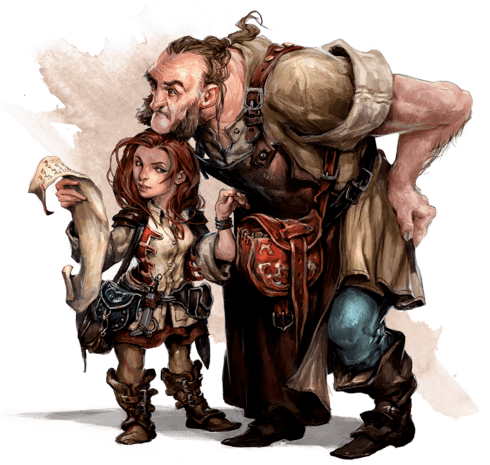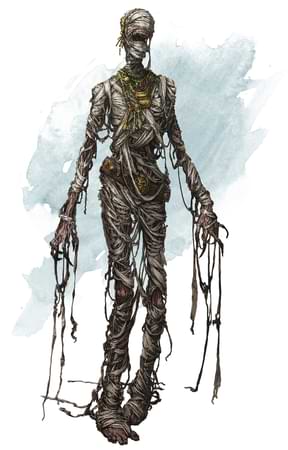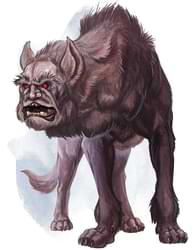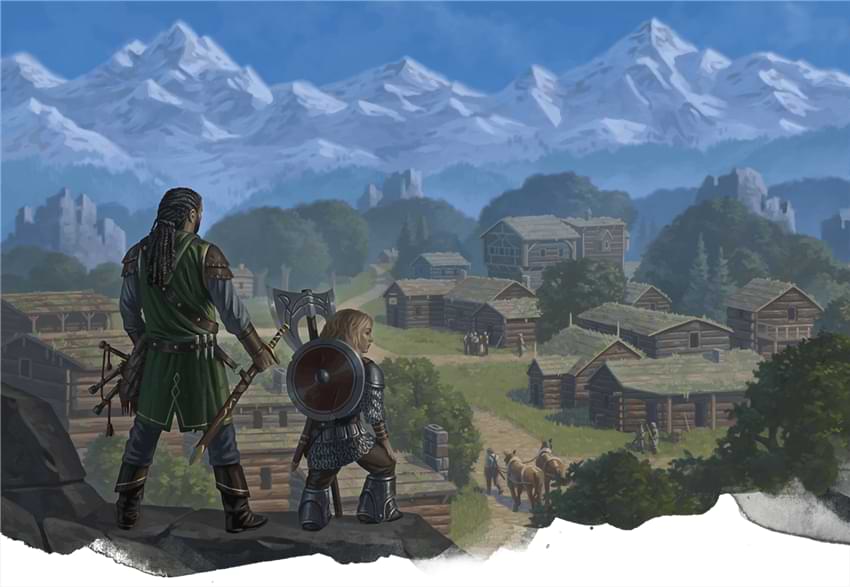A classic dilemma for Dungeon Masters is that you might have the books and ideas for an adventure but no players scheduled to play. Occasionally, though, you’ll find yourself in the opposite situation: your friends or family might be ready to play, but you have no adventure planned.
Here’s where you can get started when looking to choose or create an adventure to run at your table.
7 questions to ask when planning an adventure
1. Who are your players?
Are you playing with friends, online pals, or strangers at a convention? If the players don’t know each other well, lean toward scenarios where their characters are working together by design. For example, they might be members of the same adventuring guild. This approach can spare your players from the time and awkwardness that can come with their characters getting to know one another.
If your players have made their characters ahead of the session, pay close attention to what choices they’ve made. The player who rolled an Arcane Trickster might be grateful for the opportunity to dazzle or deceive NPCs in-game. Meanwhile, the player who chose the “Haunted One” background for their character has handed you a storytelling opportunity.
2. What are your players looking for?
 If you’re playing with close friends, you likely already know something about their tastes. Use this information to your advantage when planning the session. If you have a similar sense of humor, then there might be a specific monster or scenario that you know will get some laughs at the table.
If you’re playing with close friends, you likely already know something about their tastes. Use this information to your advantage when planning the session. If you have a similar sense of humor, then there might be a specific monster or scenario that you know will get some laughs at the table.
Adding to this, horror fans might be the perfect crew for exploring Domains of Dread from the upcoming Van Richten’s Guide to Ravenloft, and aspiring detectives could love uncovering the secrets found in Candlekeep Mysteries. The plot driving your session forward doesn’t need to be intricate or detailed, however. Players who enjoy combat could enjoy a simple scenario where they need to defend a town from hordes of monsters.
3. How experienced are your players?
If you’re teaching the game as you run it, you’ll want to offer a mix of the different pillars of adventuring — combat, exploration, and roleplay. Look to a beginner-oriented adventure like Dragon of Icespire Peak when running the game for new players, or use it as an example to inspire you as you homebrew your own.
Running combat: For new players, the process of learning D&D itself is an adventure. Even a relatively straightforward combat scenario can be enjoyable to new players as they learn the basics of what their characters can do in combat, on top of the rules of the game. More experienced players might find a more complex setup — such as one with environmental hazards — an exciting change of pace. The reward for finding the right balance here is seeing your players feel challenged without feeling frustrated.
 Running exploration: When planning for exploration, bear in mind that beginner players might want or need more guidance. Be prepared to help them figure out what their options are and make suggestions, if necessary. This might take extra time in your session, but you’ll often find that players who haven’t dungeon-crawled before will have the most creative ideas for surviving them!
Running exploration: When planning for exploration, bear in mind that beginner players might want or need more guidance. Be prepared to help them figure out what their options are and make suggestions, if necessary. This might take extra time in your session, but you’ll often find that players who haven’t dungeon-crawled before will have the most creative ideas for surviving them!
Experienced players who know trap-filled dungeons well will likely be more wary of exploring the tomb of a mummy lord. To challenge them, integrate traps into your combat. Maybe there’s a trapped door with hordes of undead locked behind, and your players need to disable a mechanism in order to stop the onslaught. Or the challenge of the dungeon could be solving a puzzle that unlocks hidden treasure, with the solution requiring the players to search different rooms for clues. These rooms could tell the story of an evil priestess who betrayed her god and was cursed to spend eternity trapped in this very dungeon.
Running roleplay: Roleplay is one area where player experience can make a big difference. Pay attention to what your players are excited or hesitant about. If you know someone is apprehensive about speaking in character but wants to try it, set them up for success by making NPCs friendly and curious and ask questions that drive the conversation forward.
If your experienced players have a knack for roleplay, social intrigue could be your ticket to an exciting adventure. Your player characters could be hired by a detective agency to investigate the mysterious disappearance of an alchemist. By interviewing NPCs and by searching for clues in the alchemist’s home and lab, your players could learn that the alchemist was captured after harvesting a medicinal herb on land protected by a druid. Your players would have to decide the best course of action to take from there.
4. How many players will you have?
Party size and level will guide which challenges you can hand your players while also affecting the pacing for your adventure. One round of combat for seven characters means a lot more discussion and decision making than a round for two characters.
With a big party, one way to prevent the problem of “I have eight players but only one has something to do” is to team the characters up for skill challenges. You could have them form pairs for a task and designate someone to roll — just for flavor — or use either of the rules presented for working together (shown below) in the Player's Handbook. With group checks, I’ll often narrate the results based on the rolls. With a group Performance check, for instance, if one person had a particularly spectacular roll, it’s a lot of fun to decide with them just how their extra flourish saved the whole group.
Working Together
Sometimes two or more characters team up to attempt a task. The character who's leading the effort — or the one with the highest ability modifier — can make an ability check with advantage, reflecting the help provided by the other characters. In combat, this requires the Help action (see chapter 9, “Combat”).
A character can only provide help if the task is one that he or she could attempt alone. For example, trying to open a lock requires proficiency with thieves' tools, so a character who lacks that proficiency can't help another character in that task. Moreover, a character can help only when two or more individuals working together would actually be productive. Some tasks, such as threading a needle, are no easier with help.
Group Checks
When a number of individuals are trying to accomplish something as a group, the DM might ask for a group ability check. In such a situation, the characters who are skilled at a particular task help cover those who aren't.
To make a group ability check, everyone in the group makes the ability check. If at least half the group succeeds, the whole group succeeds. Otherwise, the group fails.
Group checks don't come up very often, and they're most useful when all the characters succeed or fail as a group. For example, when adventurers are navigating a swamp, the DM might call for a group Wisdom (Survival) check to see if the characters can avoid the quicksand, sinkholes, and other natural hazards of the environment. If at least half the group succeeds, the successful characters are able to guide their companions out of danger. Otherwise, the group stumbles into one of these hazards.
Source: Player’s Handbook
 5. Where and how are you playing?
5. Where and how are you playing?
It can be helpful to consider what kind of environment you’ll have. There are practical concerns, like whether you’ll be able to play music or have room for maps, and social ones, like considering if you’ll need to share space with convention-goers or family members as you play. This may affect your plans to feature the Baleful Baying of a yeth hound!
6. How much time will you have to play?
Are you likely to be interrupted? Will everyone need to be out of the room in four hours? Keep your group size in mind, be realistic, and be prepared to adjust. Your players can and will surprise you. They may dawdle in a shop, or cut through your challenges at lightning speed with an unexpected burst of creativity.
For a one-shot, it can be helpful to think ahead about which part of the adventure you would skip if you needed to, and to have an extra creature or two in your pocket to waylay your players if you’re running ahead of schedule. Of course, always keep a list of some extra names for NPCs, towns and landmarks, just in case.
One good trick for choosing names is to mine any area you know well. Historical figures, authors, literary characters, and even family members could be a source of inspiration. You might even check out the names presented in Appendix B of Xanathar's Guide to Everything. Then, mix and match names or move a couple letters around to prepare your list of NPCs.
7. What sounds fun to you?
Your own interests will serve you well as a DM. If you love to do comedy or silly voices, make sure you give yourself some fun NPCs to inhabit. If your ideal day out is a trek through a national park, you can probably bring some incredible true-to-life details into a forest or desert adventure. If you’re having fun, you’ll bring a positive and excited energy to the game that your players will appreciate.
 Setting yourself up for success
Setting yourself up for success
Get your tools in order
Before game day, create a campaign on D&D Beyond and share the link with your players. Don’t get tripped up on the little things — call it “My Cool One-Shot” if you want. You can always give it a real title and description later, but this means your players can start exploring their options right away. This is even easier with content sharing: if you or someone in your party has a Master Tier subscription, you can enable content sharing, which means that your players will be able to reference and build from any official content that you have unlocked on D&D Beyond.
If you’re on a short time-table or have new players, consider handing out pregenerated characters. There’s plenty to tackle and enjoy in the game even if you didn’t roll up your own stats.
Ask questions, and answer them, too
As they choose or build their characters, your players will need to know what sources are fair game for your session and what level character to build, so try to settle those questions early even if you haven’t finished your planning. In return, get your players to give you some information, if they can.
Some of the best first sessions and one-shots I’ve played in had thoughtful DMs who sent out a few key questions to players ahead of time. This could take the form of a simple handout, be dropped into an email, or added to the public DM notes. For example, you could ask:
- What is your character’s goal?
- Do they have a prior connection to one of the other party members? (Decide this together)
- What is their favorite food, and what can’t they stand?
You’ll be surprised by what fun possibilities will arise for your story, and it gets your players thinking in character without feeling like homework, especially on short notice.
Discuss safety at the table
Make sure to have a conversation about expectations and safety. If you have a chance for a session zero, that’s a great way to make sure you’re on the same page. Whichever safety tools you choose, they should serve you and your group.
It’s important to talk about what kind of material is off limits and what themes the adventure might explore. Although this is especially true if you’re playing with strangers, don’t neglect this kind of discussion with friends. People you know well might still have content they’d rather avoid that you don’t know about.
Understanding and respecting boundaries at your table will help make for more enjoyable play. Your players will be at ease, helping establish a foundation that leads to memorable moments in the game.
Game day!
When it’s time to roll, enjoy the moment! Whether you’ve landed on a published adventure, modified one, or written your own, your players will appreciate the time and effort you’ve put into planning a game for them. So, have fun, make memories, and listen for the sweetest sound a DM can hear: “When can we play again?”
Van Richten's Guide to Ravenloft is available for preorder now in the D&D Beyond Marketplace! All preorders come with digital dice, as well as character themes, frames, and backdrops! Subscribers are able to share all of their purchased content with their table!
Amy Dallen (@enthusiamy) is a performer, writer, and professional nerd who started rolling dice in elementary school and will probably never stop. You might know her work from Geek & Sundry, DC Universe, Collider, or her own Twitch streams, where she plays games and runs a book club.








-
View User Profile
-
Send Message
Posted Apr 28, 2021Great article!!!
-
View User Profile
-
Send Message
Posted Apr 28, 2021Nice article!
-
View User Profile
-
Send Message
Posted Apr 28, 2021Great job!
-
View User Profile
-
Send Message
Posted Apr 28, 2021Awesome: thanks!
-
View User Profile
-
Send Message
Posted Apr 28, 2021Nice!
-
View User Profile
-
Send Message
Posted Apr 28, 2021This is really helpful! Why do you have "Running Monsters" as a tag, though?
-
View User Profile
-
Send Message
Posted Apr 28, 2021This is probably the best non-gameplay article (EotW, Monster101, etc) I've seen here on DDB, and one of the best articles in general. If this is the quality of writing we have to look forward to, then I'm really excited for what comes next. The advice is all super sound and easy-to-digest, especially for new players. Even as an experienced DM, I was able to find a couple of ideas that I can apply to my gaming. Keep up the good work, Amy!
-
View User Profile
-
Send Message
Posted Apr 28, 2021Awesome article I'm stuck in the exact scenario right now
-
View User Profile
-
Send Message
Posted Apr 28, 2021After the Yeth Hound bit, you mention Appendix B, but you say the Player's Handbook instead of Xanathar's Guide to Everything (the link you provided was correct, just not the text afterwards).
-
View User Profile
-
Send Message
Posted Apr 28, 2021Great article-
Further advice, I suggest to sometimes use fantasy movies/books/comics for inspiration.
Ex: My first home brew campaign was very similar to The Hobbit
-
View User Profile
-
Send Message
Posted Apr 28, 2021Nice article. Good advice to be had. Amy was awesome on DC Universe. I miss that app.
-
View User Profile
-
Send Message
Posted Apr 28, 2021This is great! I like that you mentioned Icespire Peak. One could also look at Lost Mine of Phandelver as well, particularly for those wanting intrigue but don’t have a clue where to start or an inclination toward character creation.
I’d love to see a piece on running games with a pair of PCs too, speaking to some of these considerations. Any wisdom here would be appreciated!
-
View User Profile
-
Send Message
Posted Apr 28, 2021wait so can i play w random ppl and how to i start a game anyways
-
View User Profile
-
Send Message
Posted Apr 28, 2021Very nice article that answers many questions for new players and game masters. Playing D&D from the source books is like playing MTG by just reading the cards; this article helps fill in the gaps that WoTC forgot. Nice use of the source book to support game play ideas as well.
-
View User Profile
-
Send Message
Posted Apr 28, 2021Love this article! All the hidden ads were a little bit hard to deal with, but I would hope that readers would understand that this is an organization, and those need money to run. The content was great. I really feel like all the advice out there for DMs is really technical or so general it's hard to understand, but this was nice and concise, with enough detail to understand. Personally, I've found my DMing style is a little odd: horrific and scary monsters and adventures, with ridiculous and funny NPCs and roleplaying bits. I'm lucky enough to have a group of players who accept and embrace this style, so I'm able to mix what my players want and what I want. Another instance in which I learned (in a bit of a trial-by-fire) to respect my players wishes while still having fun was when I realized that one of my players (a young 6th grader in his first session, so I guess I shouldn't have been surprised) wasn't taking the game too seriously, and just wanted to do the weirdest thing possible. I reached an agreement with him in which I would let him do his weird stuff most of the time (despite being a lawful good devotion paladin), but he would respect me when I did say no, and we could keep the campaign moving without taking away his fun.
-
View User Profile
-
Send Message
Posted Apr 28, 2021my eyes just opened
-
View User Profile
-
Send Message
Posted Apr 28, 2021Thanks so much for the great advice!
-
View User Profile
-
Send Message
Posted Apr 28, 2021Whoops! Thank you for pointing out. This is what happens when I make last-minute edits to the text.
-
View User Profile
-
Send Message
Posted Apr 29, 2021Ok first off really good article, and second, did anyone have the opposite problem and find it funny, a bunch of campaign plans and characters, but no sessions able to be scheduled?
-
View User Profile
-
Send Message
Posted Apr 29, 2021Very good article - thanks!